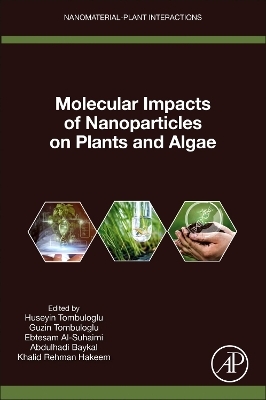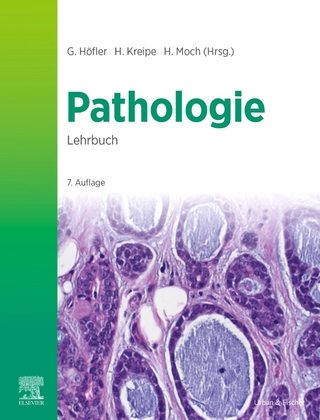
Molecular Impacts of Nanoparticles on Plants and Algae
Academic Press Inc (Verlag)
978-0-323-95721-2 (ISBN)
Huseyin Tombuloglu, PhD, is an Associate Professor at the Institute of Research and Medical Consultation (IRMC) of Imam Abdulrahman bin Faisal University, Dammam, Saudi Arabia. He received his BSc degree in Molecular Biology and Genetics, an MS degree in Biology and a PhD degree in Biotechnology. He has more than 15 years of teaching and research experience in Genetics, Molecular Biology, Plant Genomics, and Biotechnology, as well as Bioinformatics. His current research focuses on nanoparticle-plant interaction. He has published more than 60 internationally indexed articles. Among those, approximately 20 recent articles are related to nanoparticle and plant interactions at molecular and physiological levels. He has also edited two books published by a global publisher. Dr. Guzin Tombuloglu (PhD) received her MS degree (Biology) in 2008 and PhD degree (Biotechnology) in 2014. She has experience in transcriptome sequencing, genetics, molecular biology and genomics. During her PhD, she studied transcriptomics identification of boron tolerance mechanism in barley. She has experienced several projects on abiotic stress, plant stress responses, boron toxicity, transcriptomics, and nanoparticle-plant interaction on molecular level. She has given several courses on teaching Genetics, Molecular Biology, and Biotechnology education for more than 15 years. She also worked as a Chairman in Pathology Laboratory Techniques Programme and Assistant Manager at Vocational School of Medical Sciences at the university level. She is the co-editor of two international books published by Springer. Dr. Ebtesam A. Al-Suhaimi is a Professor at the Department of Biology (Endocrinology & immunology), Science College, Imam Abdulrahman bin Faisal University (IAU), Saudi Arabia, and the Dean of the Institute for Research and Medical Consultations at the same institution. She has more than 25 years of research and teaching experience in Endocrinology, Physiology, Immunology, Neuroscience, and Biology. Abdulhadi Baykal (Ph.D) is Professor and chairman of Nanomedicine Department at Institute of Research and Medical Consultation (IRMC) of Imam Abdulrahman bin Faisal University, Dammam, Saudi Arabia. He received his BSc. degree in 1991 (Chemistry Education of Middle East Technical University, Ankara-Turkey). He completed his MSc degree and Ph.D (both in Chemistry) in 1995 and in 1999 respectively. He became Assistant Professor in 2002, Associate Professor in 2009 and Professor in 2014 (Fatih University, Istanbul). He has more than 26 years of teaching and research experience in Chemistry, Nanotechnology, Analytical Chemistry, Magnetic Nanomaterials, Instrumental Analysis, Inorganic Chemistry, Nanomedicine, Cancer Therapy, etc. His major research is the synthesis, characterization, and application (plant uptake, microwave absorber, recyclable nano catalyst, cancer treatment) of magnetic nanomaterials. He has published more than 440 papers in science indexed journals. He supervised 33 master and 4 Ph.D theses. Dr. Khalid Rehman Hakeem (PhD) is Professor at King Abdulaziz University, Jeddah, Saudi Arabia. He has more both teaching and research experience in plant eco-physiology, biotechnology and molecular biology, medicinal plant research, plant-microbe-soil interactions as well as in environmental studies. He has served as the visiting scientist at Jinan University, Guangzhou, China. He has more than 110 research publications in peer-reviewed international journals has extensive book publishing experience as well. He is included in the advisory board of Cambridge Scholars Publishing, UK. He is a fellow of Plantae group of the American Society of Plant Biologists, member of the World Academy of Sciences, member of the International Society for Development and Sustainability, Japan, and member of Asian Federation of Biotechnology, Korea.
Section 1: Transport phenomena 1. Nanomaterials: properties and characterization 2. Emerging concept on cellular uptake mechanism 3. Nanoparticle: Intracellular transport processes
Section 2: Implication on Omics 4. Nanoparticle: Implication on Genome 5. Nanoparticles: Implications on Transcriptome 6. Nanoparticles: Implications on proteome 7. Nanoparticles: Implications on metabolome
Section 3: Interaction with bio-compounds and systems 8. Impacts of NPs on structural elements within the cells 9. Interaction of nanoparticles with biomolecules 10. Interaction of nanoparticles with photosynthetic machinery 11. Impact of nanoparticles on biochemical reactions
Section 4: Applications 12. Application of nanoparticles, in agriculture: nanobased fertilizers, pesticides, herbicides, and nanobiosensors 13. Nanomaterials in plant/algae genetic engineering 14. Understanding the problem at hand: Nanotechnological implications that cannot be foreseen 15. Future perspectives
| Erscheinungsdatum | 05.03.2024 |
|---|---|
| Reihe/Serie | Nanomaterial-Plant Interactions |
| Verlagsort | Oxford |
| Sprache | englisch |
| Maße | 152 x 229 mm |
| Gewicht | 450 g |
| Themenwelt | Studium ► 2. Studienabschnitt (Klinik) ► Pathologie |
| Naturwissenschaften ► Biologie ► Biochemie | |
| Naturwissenschaften ► Biologie ► Botanik | |
| Naturwissenschaften ► Biologie ► Genetik / Molekularbiologie | |
| Naturwissenschaften ► Biologie ► Limnologie / Meeresbiologie | |
| ISBN-10 | 0-323-95721-8 / 0323957218 |
| ISBN-13 | 978-0-323-95721-2 / 9780323957212 |
| Zustand | Neuware |
| Informationen gemäß Produktsicherheitsverordnung (GPSR) | |
| Haben Sie eine Frage zum Produkt? |
aus dem Bereich


